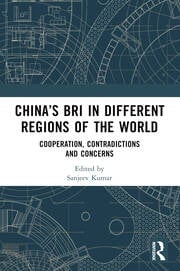
Dr. Jojin V. John, Assistant Professor, SIRP contributed two Chapters in a Book “China’s BRI in Different Regions of the World”, Published by Routledge London.

Japan’s response to China’s Belt and Road Initiative (BRI) has evolved from an initial balancing approach to complex engagement featuring conditional cooperation and outright competition driven by a complex mix of strategic, economic and normative considerations. BRI prompted the revitalisation of Japanese infrastructure diplomacy leading to the announcement of the Partnership for Quality Infrastructure (PQI), a normative and substantive policy framework. Central to the Japanese balancing strategy has been the promotion of the ‘quality infrastructure’ principle as a global standard. The conditional cooperation strategy under which Japan agreed to cooperate with China on infrastructure development in a third country, on the one hand, aimed to help Japanese companies to take advantage of the economic opportunities and, on the other hand, intends to reform BRI from within to adhere to international norms and standards. The competitive dimension of the Japanese response involves stepping up Tokyo’s infrastructure development commitments and building an international coalition under the Free and Open Indo-Pacific framework. Mapping the evolution of Japan’s BRI response, the paper illustrates that Tokyo had been treading a middle path between endorsement and containment while enhancing its position as a leading infrastructure development actor by upholding a normative and rules-based order.
This chapter is an account of South Korea’s (Korea hereafter) approach to China’s Belt and Road Initiative (BRI). Though not directly a part of any designated BRI project, Korea has shown a keen interest since its announcement. Having established a strong economic relations with China over the last decades, the initiative was seen as a new economic opportunity. In particular, Seoul viewed BRI as complementing its own efforts to integrate the Korean Peninsula to Eurasia through multi-modal transport and industrial linkages. Successive Korean governments have also seen BRI as an opportunity to induce reform and opening up of North Korea. However, influenced by the growing negative narrative of BRI and the intensification of the US-China strategic competition pushed Korea to undertake a cautious approach to BRI.
© 2025 Priyadarsini Hills, Kottayam,Kerala,India, Pin: 686560
